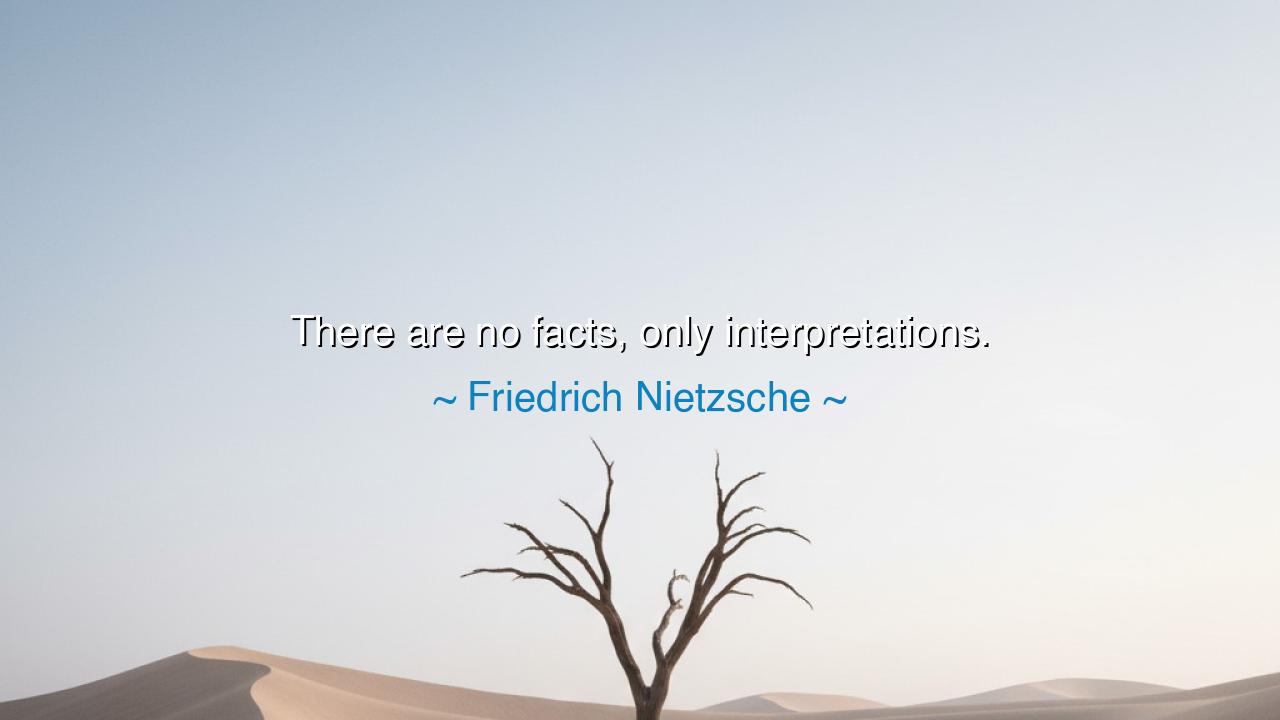
There are no facts, only interpretations.






Friedrich Nietzsche, in his bold defiance of convention, once proclaimed: “There are no facts, only interpretations.” These words strike like lightning upon the mind, shattering the illusion that reality is simple, fixed, and absolute. Nietzsche was not denying the existence of the world, nor the events that unfold within it. Rather, he was unveiling a deeper truth: that everything we call a fact is already shaped by the lens through which we view it. Human beings do not perceive the world as it is; we perceive the world as it appears to us, colored by culture, memory, desire, and belief.
The ancients would have understood this. For was it not Heraclitus who said that no man steps into the same river twice? The river flows and changes, and so does the man. What one calls a fact—“the river is here”—is never static, but a fleeting interpretation of a moment. Likewise, Nietzsche reminds us that we live not in cold, eternal certainties, but in shifting perspectives. The interpretation of reality is what gives it meaning, and meaning itself is born from the human spirit.
History provides powerful examples of this truth. Consider the discovery of the New World. To the Europeans of the 15th century, it was a land “discovered.” To the peoples already living there, it was not a discovery at all, but an invasion. The same event, two different interpretations—one casting it as triumph, the other as tragedy. The fact of ships arriving upon distant shores was indisputable; but the meaning of that fact depended entirely on the eyes that beheld it.
Or reflect upon the French Revolution. One historian may write of it as the noble rise of the oppressed against tyranny; another may see it as the descent of humanity into chaos and bloodshed. Which is true? Nietzsche would say: both, and neither. For there are no naked facts; every recounting, every retelling, every memory is an interpretation, clothed in values and judgments. Thus, truth is not an object one can hold, but a horizon that shifts as one walks toward it.
But Nietzsche’s words are not meant to cast us into despair. They are a call to courage. If all is interpretation, then we are not passive receivers of truth but active creators of it. We are not chained to a single vision of reality; we are artists of meaning, sculptors of understanding. The danger lies not in the lack of facts, but in forgetting that our “facts” are interpretations—mistaking our perspective for eternal truth, and thus becoming rigid, blind, and tyrannical.
The lesson is clear: live with humility, knowing that your interpretation is but one among many. Listen to others, for their vision of the same world may reveal what you cannot see. Live also with boldness, for you are free to shape your own meanings, to interpret life not as victim but as creator. Do not cling to “facts” as though they were divine commandments; instead, recognize the power of perspective, and use it to deepen your understanding of the world and of others.
Practical action follows this wisdom. When faced with conflict, ask not only, “What happened?” but also, “How is it seen?” When you hold an opinion strongly, pause to remember that it is your interpretation, not eternal law. When you tell your own story, tell it as one interpretation, open to growth and change. In this way, you will walk not as a prisoner of false certainty, but as a traveler on the open road of truth, ever learning, ever evolving.
Thus, Nietzsche’s words resound through the ages: “There are no facts, only interpretations.” They are not a denial of reality, but a revelation of the power of human vision. To live by them is to see the world not as fixed stone, but as living clay, forever being shaped. And in that shaping, the spirit of humanity finds both its burden and its glory.






NTY Nhi Nguyen Tran
Nietzsche’s statement brings to mind the limitations of human understanding. If there are no facts, only interpretations, it suggests that everything we know is filtered through our subjective lenses. But can this idea be dangerous, especially in situations that require factual clarity? How do we find a balance between recognizing that interpretations shape our reality and still striving for objective truths in fields like science or history?
NNgoc
This quote really challenges how we see the world. If all we have are interpretations and no hard facts, how do we know when we’re truly understanding something, or when we’re just distorting it to fit our views? Does this idea diminish the value of objective facts, or does it simply remind us that all knowledge is influenced by human perception? Can we ever be truly objective?
UGUser Google
I find this quote both liberating and unsettling. If there are no facts, only interpretations, it means our understanding of reality is always subjective. Does this mean that truth is fluid, changing with each person’s perspective, or is there an underlying objective truth that we just can't fully grasp? How do we navigate a world where everyone’s interpretation of the same event can be vastly different?
LNYenn Lee Nek
Nietzsche’s assertion that there are no facts, only interpretations, challenges the very idea of objective truth. It makes me wonder if everything we know is shaped by personal perception or societal influences. Can we ever truly experience something without interpreting it through our own biases and perspectives? Is it possible to ever know 'pure' facts, or are we always interpreting based on our context and experiences?